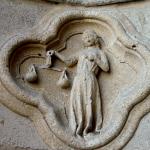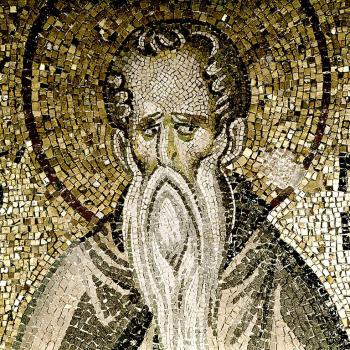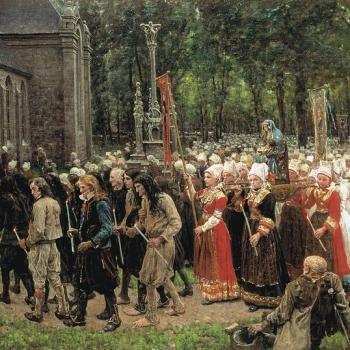
In the Byzantine tradition, the two Sundays which come right before the Great Fast (Lent) first have us consider our own spiritual status (the Sunday of the Last Judgment, on which we are encouraged to consider who and what we have become), so that we, we will come to realize how far off we are from what God intended us to be and so accept God’s help to fulfill that potential. Then, on the Sunday which comes the day before the Great Fast begins, Forgiveness Sunday, we not only will have come to accept the need for God’s grace, we will embrace the spirit of forgiveness itself, a spirit which will have us share with others that which we have received ourselves.
Jesus is going to come again to judge the living and the dead. Jesus told us that the way he will judge us will be upon the way we have made ourselves to known to him, and we make ourselves known to him by embracing the way of love, doing the works which flow from it. Like recognizes like, and we, made in the image and likeness of God, are called to realize the potential we have been given by being granted the image of God in us. God is love, and so we are to reflect that love, and the more we do that, the more Jesus will see himself in us and so welcome us to the kingdom of God. This is why Jesus described the way he will conduct the last judgment will be based upon the way we have dealt with the poor, the needy, and the oppressed. Have we helped relieve them of their pain and suffering? Have done what we can to overturn systemic injustices? Have we ignored their plight, or made it worse? Insofar are we fail to follow through with the justice (a justice motivated out of love and embraced with mercy) Jesus expects from us, we have failed the expectations of divine love. When we do not properly reflect it, Christ will not see himself in us, and in this way, he will be able to say he does not “know” us.
It is not that he is ignorant, but rather, it is the kind of knowledge which he seeks to have of us which is important. As long as we put on the mask of unlove over our true person and remain attached to it, we are not someone Jesus knows. The more we reflect upon our lives, the more we will see that we have, at least on some level, failed to follow the expectations of love. What does that mean concerning our relationship with God? The Sunday before the Great Fast, Forgiveness Sunday, says we do not have to fear that if we have failed the expectations of love, we never be able to attain the kingdom of God. We have the chance to change, to transform, to let grace help us cast off the remnants of unlove and the defilement it brings upon us and become the person Jesus knows and loves from eternity. We must do our part, but without help, we will not be able to do enough; we need forgiveness and the grace which comes from it.
Once we accept that we can be forgiven, that our past does not have to be destiny, we should see how this is true for everyone. When we embrace forgiveness, we must embrace its spirit in our lives, making it so that we can forgive others. We must do what we can to bridge the rifts sin have created that lead us to be separated and divided from others; however, we must also recognizing this is only possible if both sides of the rift are able to change for the better. If one side is unwilling to change, if one side is unwilling to work for the common good, then sin continues to create divisions and harm the common good. Forgiveness Sunday embraces this point, which is why on it, the faithful in a parish are called to work together, and to forgive each other the trespasses they have experienced over the last year.
Now, to be sure, we must not make forgiveness into a tool of cheap grace, where no real reform, nor real change is needed — those who have been unjust can be forgiven, but they must recognize their injustice, repent, and change for forgiveness to be theirs (from us and from God). Paul, therefore, reminds us that today is the day to take into consideration all that is expected of us, and make sure we cast outside of ourselves all the dark influences which would not only have us ignore the way of Christ’s love, but would have us replace it with the way of selfishness and all the inordinate passions which come out of it:
Besides this you know what hour it is, how it is full time now for you to wake from sleep. For salvation is nearer to us now than when we first believed; the night is far gone, the day is at hand. Let us then cast off the works of darkness and put on the armor of light; let us conduct ourselves becomingly as in the day, not in reveling and drunkenness, not in debauchery and licentiousness, not in quarreling and jealousy. But put on the Lord Jesus Christ, and make no provision for the flesh, to gratify its desires. (Rom 13:11-14 RSV).
We are to put on Jesus Christ, the just one, and follow him in his work for justice in the world. We are to take into consideration the Sermon on the Mount and what it would mean for society if we followed it out. We are to be in solidarity with all those in whom Jesus said he is to be found, those who are unjustly oppressed by the powers that be. We are to take all those who have been hurt and manhandled and bring them into Christ’s loving embrace. We are to find ourselves becoming one with them in Christ, realizing the same Christ who is found in us is found in them. Jesus is at the center of it all; he is working with those who have suffered injustice, bringing his healing grace to them, even as he is working with those who commit such injustice, seeking to convert them, helping them see the error of their ways so that they can change and partake of Jesus’ justice for themselves. Jesus works to undermine the ways of sin; where sin takes accidental or non-essential differences as a basis for division, he creates bridges so that everyone can come together and realize a unity in love. And if we truly find ourselves joined with Christ, we should be doing the same thing, which is why Paul said:
As for the man who is weak in faith, welcome him, but not for disputes over opinions. One believes he may eat anything, while the weak man eats only vegetables. Let not him who eats despise him who abstains, and let not him who abstains pass judgment on him who eats; for God has welcomed him. Who are you to pass judgment on the servant of another? It is before his own master that he stands or falls. And he will be upheld, for the Master is able to make him stand (Rom. 14:1-4 RSV).
We are not to pass unjust judgment on others, for when we become judgmental, we end up subjugating others based upon our own private interests, putting ourselves over and above the common good. Indeed, we end up judging not only those whom Christ has affirmed, but Christ himself, as he is found in those whom we have offended. When we see ourselves doing this, let us quickly put a stop to it and repent. If we do so, we can receive forgiveness – from Christ, but also those whom we have offended, but only if we truly repent and seek to restore that which we have destroyed due to our sin. The more we do this, the more we find ourselves overcoming the structures of sin and the divisions they create, so that in the end, we have nothing but love between us and others, a love which binds as together, allowing us to be truly one in the body of Christ.
Stay in touch! Like A Little Bit of Nothing on Facebook.
If you liked what you read, please consider sharing it with your friends and family!
N.B.: While I read comments to moderate them, I rarely respond to them. If I don’t respond to your comment directly, don’t assume I am unthankful for it. I appreciate it. But I want readers to feel free to ask questions, and hopefully, dialogue with each other. I have shared what I wanted to say, though some responses will get a brief reply by me, or, if I find it interesting and something I can engage fully, as the foundation for another post. I have had many posts inspired or improved upon thanks to my readers.
















